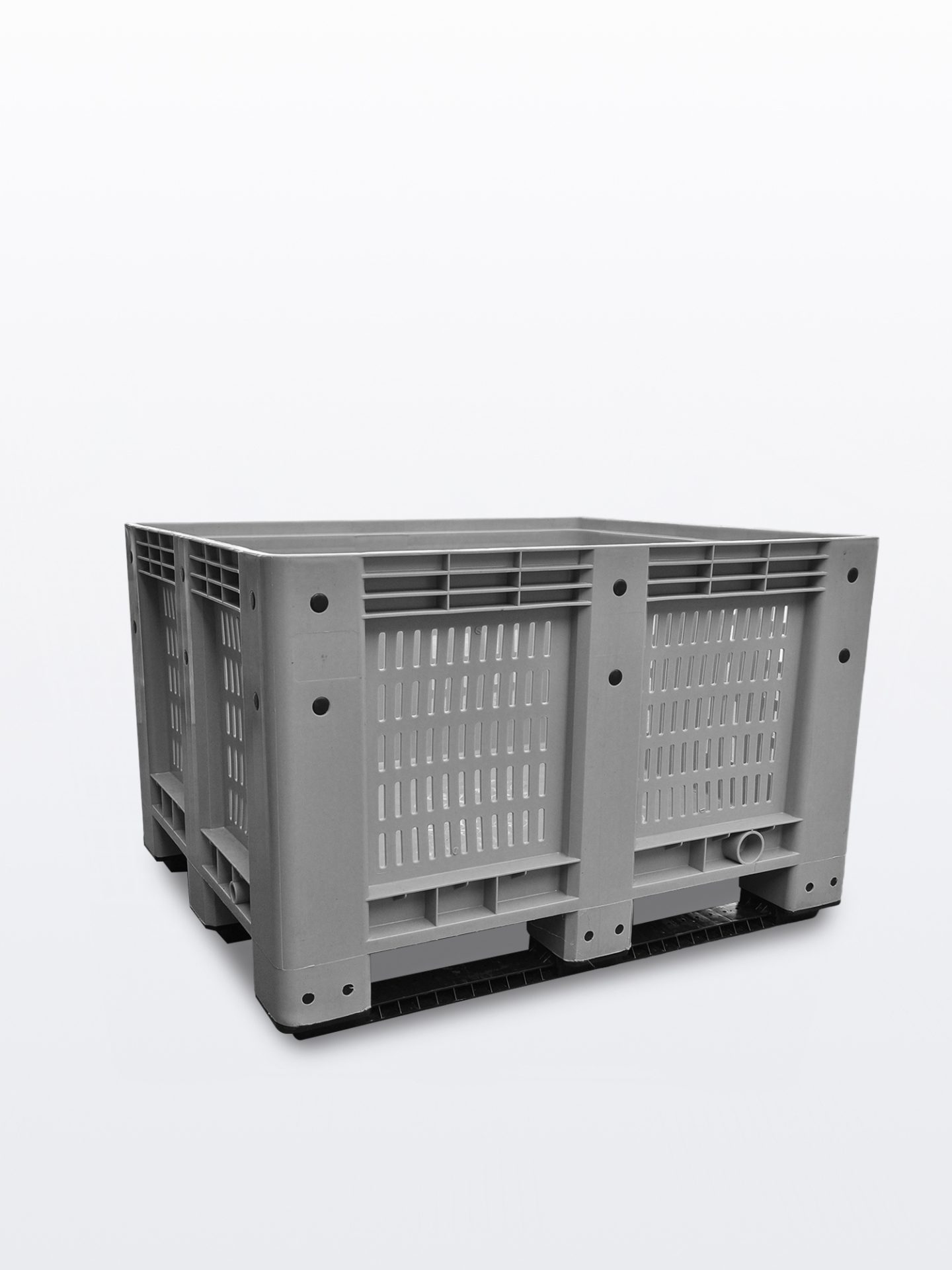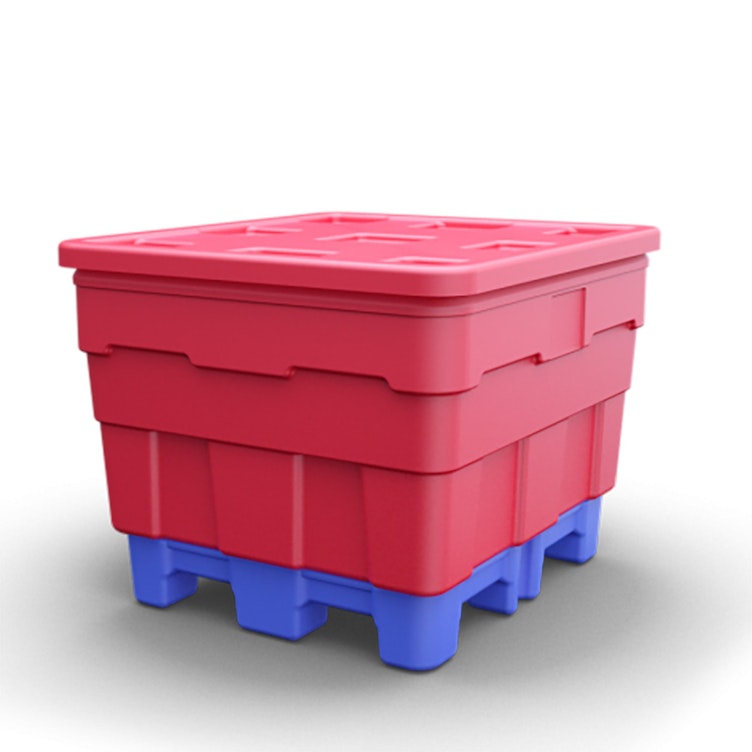A Comprehensive Guide to the Various Kinds of Mass Plastic Containers Available Today
Bulk plastic containers play a crucial function in various markets, supplying solutions for storage and transport. Their diverse kinds deal with various demands, from inflexible options for solid materials to versatile containers fitting numerous forms. Each kind provides distinctive benefits, making it vital to understand their applications and functions. As markets advance, so do the needs for efficient container solutions. What factors should one consider when selecting the right bulk container?
Review of Mass Plastic Containers

Kinds of Mass Plastic Containers
Mass plastic containers can be found in numerous types, each fit to particular applications. Rigid bulk containers, adaptable mass containers, and intermediate mass containers stand for the main categories, each offering unique benefits. Comprehending these types is vital for picking the appropriate container for moving and saving materials.

Stiff Bulk Containers
Rigid mass containers are vital for effective storage and transport of numerous materials throughout industries. These containers are commonly built from long lasting plastics, permitting them to hold up against severe handling and ecological conditions. They are available in various sizes and shapes, including containers, drums, and totes, making them suitable for storing every little thing from granular compounds to fluids. Inflexible containers often include reinforced wall surfaces and secure covers, ensuring the contents continue to be safeguarded during transportation. Their stackable layout maximizes storage area, making them ideal for storehouses and manufacturing facilities. In addition, numerous stiff mass containers are recyclable and recyclable, adding to sustainability initiatives. In general, their effectiveness and flexibility make stiff mass containers an important element in supply chain operations.
Versatile Mass Containers
Flexible mass containers, usually referred to as flexible intermediate bulk containers (FIBCs), function as a flexible option for saving a selection and transporting of dry materials. These containers are usually made from woven polypropylene and are developed to be light-weight yet solid, enabling efficient handling and piling. Their adaptability allows them to suit different shapes and sizes, making them suitable for products varying from grains to chemicals. FIBCs can be equipped with attributes such as spouts for very easy filling and discharge, in addition to protective finishings for improved toughness. Furthermore, they are recyclable and recyclable, contributing to sustainable techniques in sectors such as agriculture, food handling, and building. In general, flexible mass containers supply a cost-efficient and effective option for bulk material monitoring.
Intermediate Bulk Containers
Intermediate bulk containers (IBCs) are vital for the efficient transportation and storage space of liquids and granular products across numerous markets. These containers generally have an ability ranging from 275 to 330 gallons and are designed for easy piling and managing. Made from resilient products like high-density polyethylene or steel, IBCs offer excellent security against contamination and ecological factors. Their style includes functions such as an integrated pallet for forklift gain access to and a removable top for simple filling and cleansing. IBCs are widely made use of in chemical, food, and pharmaceutical industries, ensuring conformity with safety and security policies. Their convenience and reusability make them a cost-efficient service for mass storage and transport, adding to provide chain efficiency and sustainability.
Functions and Advantages of Mass Plastic Containers
Mass plastic containers are vital devices in various industries, using a mix of resilience and practicality. These containers are built from high-grade materials, making them resistant to effects, chemicals, and environmental aspects. This effectiveness assurances item safety and security throughout storage space and transportation.
Additionally, bulk plastic containers are lightweight, helping with ease of minimizing and handling delivery prices. Their stackable layout maximizes storage efficiency, enabling optimized storage facility space. Numerous models feature safe covers or closures, supplying a closed seal that protects contents and prevents contamination.
Bulk plastic containers are often multiple-use and recyclable, contributing to lasting methods. Their convenience permits a vast array of applications, from food storage to commercial use, boosting their worth across markets. Companies take advantage of the lengthy lifespan and reduced upkeep needs of these containers, making them an affordable service for both long-lasting and short-term needs.
Industries That Utilize Bulk Plastic Containers
Various industries take advantage of the usage of mass plastic containers, each leveraging their distinct residential or commercial properties for particular applications. The food and beverage industry counts on these containers for safe storage space and transportation of items, while the chemical manufacturing industry utilizes them for dealing with dangerous materials. Additionally, the pharmaceutical circulation requires highlight the importance of resilience and cleanliness in packaging remedies.
Food and Drink Market
As the need for reliable and risk-free storage space options continues to climb, the food and drink industry significantly counts on bulk plastic containers for their functional requirements. These containers supply robust, light-weight, and flexible options for saving components, finished items, and waste materials. Made from food-grade products, they guarantee conformity with health and wellness criteria. Various layouts, such as stackable bins and lug boxes, enhance room during transport and storage space, boosting logistical effectiveness. In addition, the transparency of some mass containers enables for very easy supply administration, reducing the danger of spoilage. With the market's emphasis on sustainability, numerous suppliers are now using multiple-use and recyclable options, straightening with environmentally friendly techniques while meeting the high needs of food safety and security and hygiene.
Chemical Manufacturing Field
The chemical manufacturing market counts heavily on bulk plastic containers for the risk-free and reliable storage space of basic materials, intermediates, and finished products. These containers are created to withstand different chemicals, guaranteeing that hazardous products do not leakage or deteriorate the container itself. Typical types include high-density polyethylene (HDPE) and polypropylene containers, which use superb chemical resistance and resilience. Their lightweight nature and stackable layout facilitate transportation and storage space, optimizing space in producing centers. In addition, many bulk plastic containers include functions such as tamper-evident seals and easy-to-read labeling, improving security and conformity with sector laws. Overall, bulk plastic containers are integral to the chemical manufacturing process, providing reputable services for managing diverse compounds.
Drug Distribution Requirements
Pharmaceutical distribution relies on bulk plastic containers to fulfill rigorous safety and security and governing needs. These containers are necessary for moving and storing a range of pharmaceutical products, including active pharmaceutical active ingredients (APIs) and ended up medicines. Their design guarantees defense against contamination, light, and moisture, keeping the stability of sensitive products. In addition, mass plastic containers are compliant with industry criteria such as Great Manufacturing Practices (GMP) and are usually made from products that are FDA-approved. Using these containers boosts effectiveness in the supply chain, permitting risk-free, large-scale circulation while reducing waste. Firms in the pharmaceutical market prioritize the usage of resilient, watertight, and tamper-evident containers to ensure product safety and security and high quality throughout the logistics process.
Factors to consider for Choosing the Right Container
When choosing the suitable mass plastic container, various variables need to be thoroughly evaluated to ensure perfect capability and safety. The nature of the products to be saved is vital; compatibility with the container's product can affect stability and safety. bulk plastic containers for sale. Additionally, the container's dimension and form should straighten with the storage space and transportation needs, guaranteeing reliable space use
Lots capacity is one more essential consideration, as it ought to accommodate the weight of materials without risk of damage or failure. The design functions, such as venting or lids, can impact use and access. Compliance with market guidelines is essential, especially in markets like drugs, where safety criteria are rigid.
The anticipated life expectancy and longevity of the container need to be assessed to confirm it meets the functional requirements without frequent substitute. By reviewing these factors, one can select one of the most ideal mass plastic container for details applications.
Ecological Influence and Sustainability
As companies progressively prioritize sustainability, the environmental impact of bulk plastic containers has actually come under analysis. These containers, usually made from products such as polyethylene or polypropylene, add considerably to plastic waste if not managed properly. Their manufacturing entails the usage of fossil fuels, which can result in increased greenhouse gas emissions. Innovations in recycling modern technology and the advancement of biodegradable choices are assisting to reduce these problems.
Lots of manufacturers are taking on practices that stress the use of recycled materials, consequently decreasing the need for virgin plastics. The sturdiness of mass plastic containers likewise plays a duty; they are developed to be recycled multiple times, which can decrease their general ecological footprint when contrasted to single-use options. Eventually, the sector faces the difficulty of stabilizing performance with eco-friendly responsibility, making lasting techniques vital for the future of mass plastic containers.
Best Practices for Storage and Transport
Effective storage and transport of bulk plastic containers considerably affect both operational effectiveness and sustainability. To make the most of area, companies need to stack containers safely, ensuring security and avoiding damage. Correct labeling is crucial for plastic bulk containers easy identification, which enhances access procedures. In addition, maintaining a well organized and clean storage area decreases the danger of contamination and boosts safety and security.
For transport, picking the best automobile is important; containers must be protected to prevent moving throughout transportation. Business must likewise take into consideration using pallets to facilitate easier loading and unloading. Regular inspections of containers for wear and tear can prevent costly substitutes.
Temperature level control is an additional crucial aspect, as severe conditions can compromise the integrity of the plastic. Finally, training employees on ideal techniques for managing and transportation assurances compliance and promotes a society of safety and security. By applying these finest methods, businesses can boost their operational efficiency while contributing to ecological sustainability.
Often Asked Questions
Exactly how Do I Clean Mass Plastic Containers Efficiently?
To clean bulk plastic containers properly, one must rinse them with cozy water, use a light detergent and scrub with a soft brush. Wash thoroughly, after that permit to air dry entirely before storage space or reuse.
What Is the Lifespan of Mass Plastic Containers?
The lifespan of mass plastic containers generally varies from 5 to 10 years, relying on the material, use, and environmental problems. Proper upkeep and storage can substantially extend their functionality and resilience with time.
Can Bulk Plastic Containers Be Personalized?

Do Mass Plastic Containers Have Service Warranty Options?

Exist Rules for Making Use Of Mass Plastic Containers?
Yes, laws exist for making use of mass plastic containers, largely concentrated on safety and security, ecological effect, and material compliance. These regulations guarantee that containers fulfill market criteria and are appropriate for delivering different compounds safely and efficiently.
Inflexible mass containers, versatile bulk containers, and intermediate mass containers stand for the main categories, each offering distinct advantages. Flexible mass containers, commonly referred to as versatile intermediate bulk containers (FIBCs), offer as a flexible service for keeping a variety and transporting of completely dry products. The chemical manufacturing sector counts heavily on mass plastic containers for the risk-free and efficient storage space of raw products, intermediates, and finished items. bulk plastic containers for sale. These containers are created to stand up to numerous chemicals, ensuring that hazardous products do not leakage or break down the container itself. Additionally, mass plastic containers are compliant with sector requirements such as Excellent Manufacturing Practices (GMP) and are often made from products that are FDA-approved